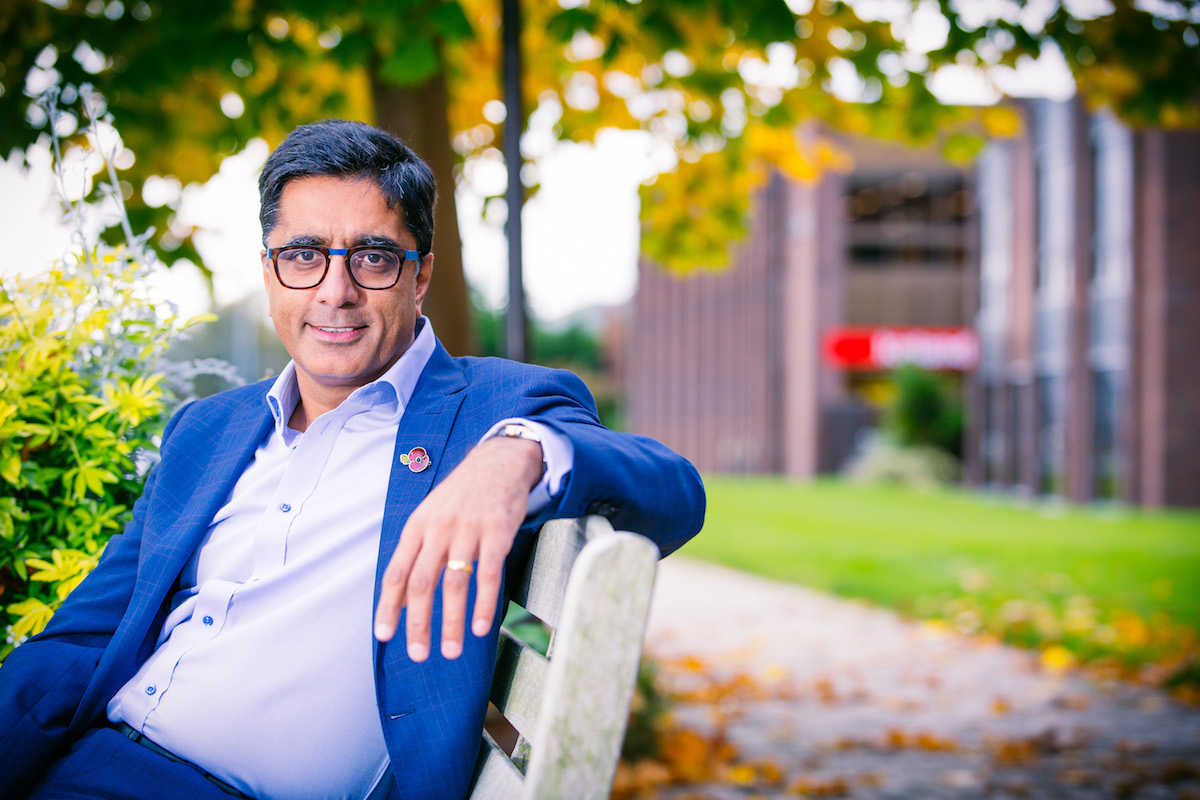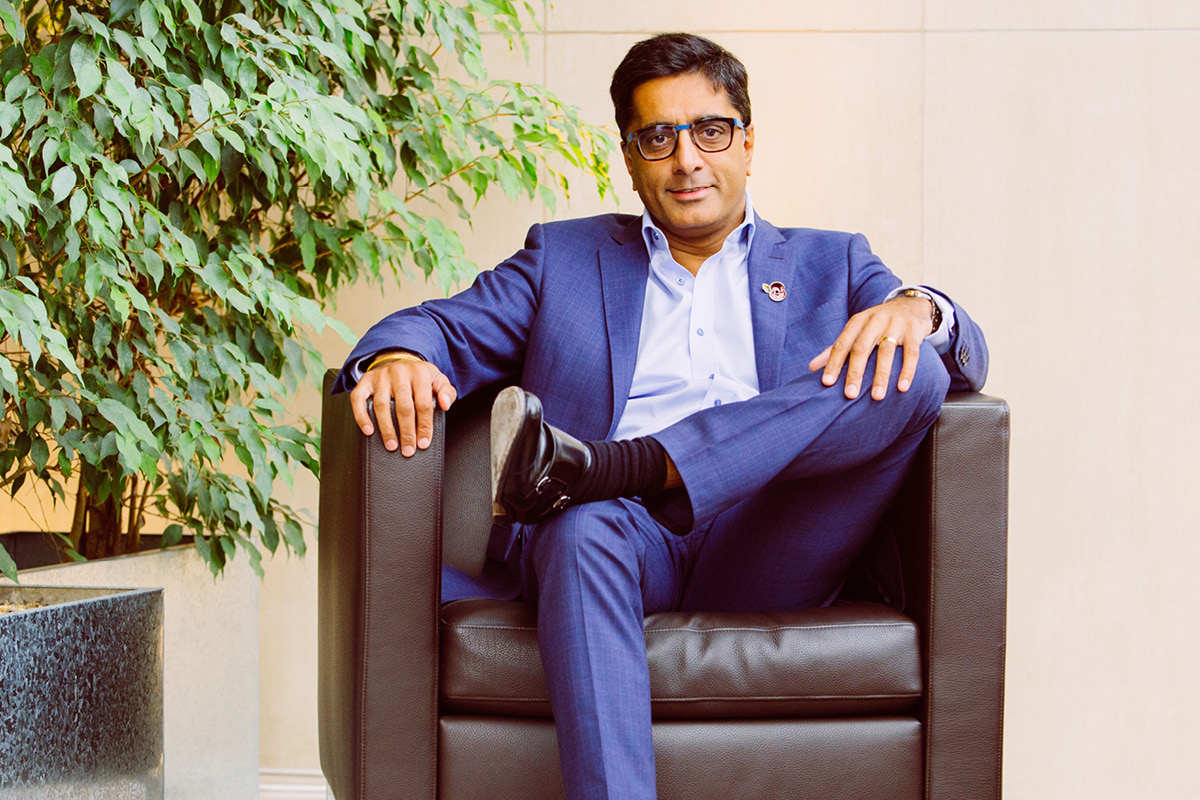As F Scott Fitzgerald would have it, there are no second acts in American lives. For Tarsem Dhaliwal, Group Managing Director of British supermarket chain Iceland Foods, however, an unexpected second chance saw him completely turn around the fortunes of the company he
was once booted out of.
Tarsem had been involved with Iceland since 1985 and had progressed to a finance director role by 1995. In 2001, however, a new management group forced Tarsem and other senior executives, including founding CEO Malcolm Walker, out of the company. Just four years later, the business was floundering, and Tarsem was part of the consortium that bought back the retailer in what he says was an opportunistic move.
“We saw that Iceland wasn’t performing well under the previous management and that they had complicated the business,” Tarsem explains. “They made it something it wasn’t. Sales had deteriorated to such a level that the business itself wasn’t making any profit.
“It was also an opportunity to correct some of our own previous mistakes when
we were in the business four years prior. It gave us the opportunity to effectively change Iceland back to what it was, give some security to our staff, make sure our customers were happy, and, obviously, that the shareholders could make some money.”
Believing that there must be a way to run a business with a £2 billion turnover at a profit, Tarsem and colleagues secured financing from banks and shareholders, and purchased Iceland for £155 million, and went to work. In just 18 months, the resurgent company had paid off this loan, and the second act was underway.
Move to a more streamlined structure
When Tarsem returned to Iceland, he found management was massively overstaffed, with around 1,400 people at head office and 50 directors. “It had so much complexity built into its supply chain and store infrastructure,” he recalls.

“All we did was simplify it. Before the restructure, Iceland didn’t understand what its purpose was, so why would its customers? We adopted a very simple motto, which was: ‘Focus, simplicity, reality and urgency’. We focused on the thing that Iceland is good at: frozen food.”
Hard decisions had to be made during the restructure, Tarsem says, with the head office staff being reduced to 600. “That saved some money; but the real benefit was the ability to make decisions quickly. The structure before was just stifling the company; it was like doing business in treacle.
We weren’t afraid to fail, because the business had already failed … It was just, ‘Let’s get on with it’
“We had to accept reality. We had to get ourselves out of the situation. It was really hard. But when you have a business that doesn’t make money, it’s on the edge. You haven’t got the time or luxury to contemplate data. You have to make the call there and then and hope you can move away from the edge of the cliff.”
A focus of the restructure was to move more cash into the balance sheet, ensuring Iceland could continue trading for the next couple of years. There was also a concerted effort to cut red tape and reporting chains within the business.
“We made making decisions easy. We weren’t afraid to fail, because the business had already failed. So there was no complicated policy document. It was just. ‘Let’s just get on with it.’ We fixed each problem one at a time, and quickly.”
Finding its focus
Another key to its renewed success was cutting through the clutter of a convoluted business model. In Tarsem’s absence, Iceland had become more of a convenience store, greatly increasing its product lines while moving away from its previous focus on frozen food, which Tarsem says is the “lifeblood” of the business. “Frozen food is who we are. It is our heritage and also our responsibility to continue innovating.”
Iceland has invested more than £2 million in a development kitchen at its Deeside head office to stay at the forefront of frozen food retailing. Tarsem says it is the best facility of its kind in Europe, and possibly the world. He describes it as a statement of intent. “It ensures the quality of our products doesn’t go backwards. It’s also a statement to suppliers, to journalists, to anybody who wants to come and talk to us about the effort and passion we put into our food and how much we care about it.”
Once the company had refocused on frozen food, Iceland introduced an online shopping site, taking care to ensure it had a straightforward, easy-to-use interface that highlighted the quality of its frozen produce. “The website is very simple; you don’t need a maths degree to order any products from us.”
The company has also had tremendous success with its free-delivery initiative, which kicks in when a customer spends more than £20. Tarsem says the concept was seen as just another cost when first raised by Malcolm Walker, but its value became clear when the company realised many shoppers do not have access to a car and many stores lack car-parking facilities.
“That limited people’s ability to buy large orders, particularly if it’s frozen, because it gets heavy and defrosts. But when we solved that problem, we saw a huge increase in sales. It paid for itself very quickly.”
The fight against Alzheimer’s
When it comes to charitable giving, Iceland Foods chooses to give to a single charity in the hope its contribution moves the needle. Presently, it is donating to Alzheimer’s disease research. “Alzheimer’s is going to kill more people than anyone realises,” Tarsem laments.
“It’s incredibly difficult to see a loved one fading away with Alzheimer’s. Even though they are physically still with us, their soul is slowly draining away, leaving them as an empty shell, unrecognisable as the person that they were. We’ve committed to give £10 million to create a research centre. We will continue to invest in this cause because we just believe it’s the right thing to do.”
Lessons learned outside the business
“It taught me about other aspects of the business that I wasn’t aware of,” Tarsem says of his four-year break away from Iceland. In a business of this scale it is easy to rely on specialist departments like finance, HR and legal, and develop a silo mentality, he notes. Away from Iceland, there was not the luxury of deferring. “You have to be everything because unfortunately you never have the finances to have that large infrastructure.”
I was a very resilient person anyway, but that time [away from the company] made me more resilient and adaptable.
In addition to learning more about business, Tarsem says he learned about himself when away from the company. “I was a very resilient person anyway, but that time made me more resilient and adaptable. It made me realise that problems can be solved in myriad different ways, not just in the ways I was taught in Iceland.”
The importance of culture
Tarsem describes himself as a demanding but fair manager, and is proud of Iceland’s record as two-time winner of The Sunday Times Best Companies award. He says that unlike some of its peers, Iceland has not tried to game the system.
“What some companies do is, when they enter, they hope to get as high a ranking as possible. Once they get first place, they stop entering because the only way after that is down. But we always enter. The culture we have in our business is very important to us.”
Tarsem says a family culture and an adherence to a healthy work–life balance have been key to Iceland winning this acclaim. “I don’t expect anybody in the stores to know who I am. But I do expect them to know who their boss is, and I expect their boss to know their team’s names. We do expect a lot from our staff, but we also care a lot about them as well.”
Away from work, Tarsem is a fervent Manchester United fan and season ticket holder, often attending games with his son. He has mellowed in his support in recent years. “Manchester United used to ruin my weekends. I used to relive the game in my head over and over again if we lost, thinking what we could have done differently. Now I’m probably a little bit more mature, so I take a more balanced view. If we don’t have a good game, it doesn’t ruin my weekend; but I still care passionately.”
The older, wiser Tarsem is relishing his second stint at Iceland and sees work–life balance as important, though hard to define. “The reality is, in senior management positions, everything is intermingled,” he says. “There are no separate drawers where I put my football or my family or my business. It’s just one big treasure chest, all mixed and muddled up. But it works.”



